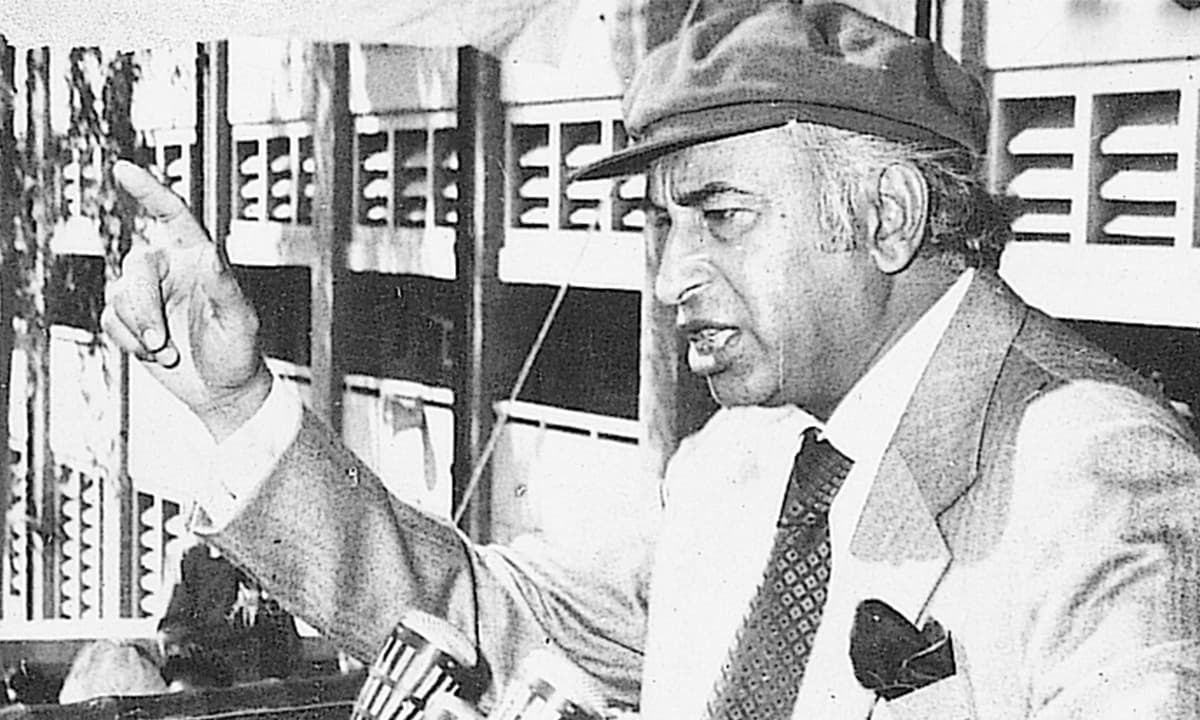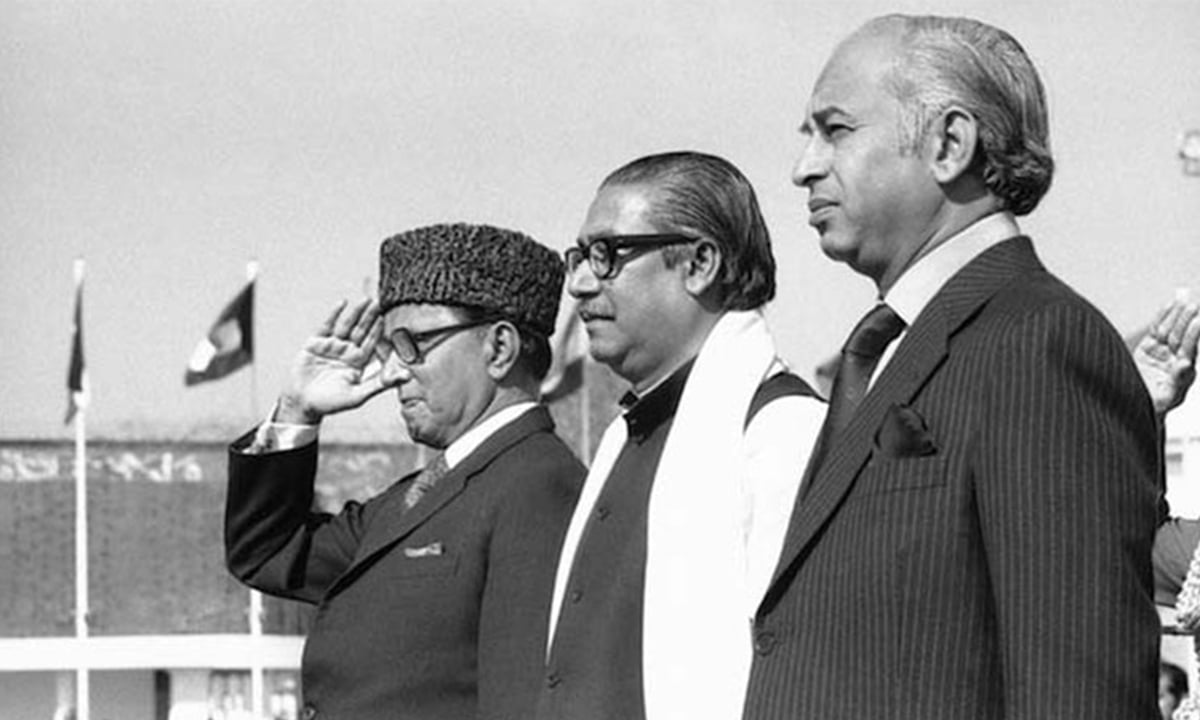Zulfikar Ali Bhutto: Pakistan's most divisive political leader

It may be regarded as a universal truth in a democratic polity that every active politician is liked or disliked by people according to their own political proclivities and social inclinations. In Pakistan, emotions always run high and voters tend to think in binaries about whom they support or detest. But once rulers or politicians are deceased, a consensus emerges over time about their overall position in history with respect to their character, ideas, actions and achievements: any mention of General Ziaul Haq will be blown away by a waft of disdain and negativity; a reference to Benazir Bhutto will always evoke empathy and respect.
When it comes to Zulfikar Ali Bhutto, opinion is always divided. He continues to segregate the public sharply and decisively along the lines of class and support or opposition to civilian democracy’s supremacy over military hegemony.
The conflicting positions of his admirers and detractors make his character contentious, his ideas divisive, his actions controversial and his achievements disputed. One may say that the contradictions of Pakistan’s state and society are all manifested in the life and death of Zulfikar Ali Bhutto.
He rose to prominence at an early age, achieved personal and political milestones at an extraordinary pace and was only 51 when he was hanged to death in 1979. His political career can be divided into four phases. In the first phase (1957-1965), he started his political career by joining president Iskander Mirza’s cabinet. He continued to work under General Ayub Khan after the 1958 military coup. He held various important ministerial portfolios, finally becoming foreign minister in 1963.

The highlights of this tenure as foreign minister include the initiation of Pakistan’s relationship with China and success in attracting investment and commerce from countries in the Soviet bloc. Zulfikar Ali Bhutto’s personal inclination towards the socialist ideology and his desire to be seen as a pro-people politician helped him become the chief architect of Sino-Pakistan relationship that continues to flourish to this day.
He also made Pakistan a prominent member of the Non-Aligned Movement, built close diplomatic relationships with the Arab nationalist-cum-socialist Ba’ath parties and extended support to movements for national liberation and progressive change in Latin America, Asia and Africa. These were remarkable achievements for a recently created developing country in the highly polarised world of the Cold War era.
What Zulfikar Ali Bhutto did internally and vis-à-vis India, however, was in stark contrast to his policy choices in external affairs. He actively supported Ayub Khan in his presidential referendum against Fatima Jinnah and backed Operation Gibraltar in Kashmir that resulted in an all-out war with India in 1965. Soon after the Tashkent Declaration calling for a ceasefire, brokered by the Soviet Union, he fell out with Ayub Khan, accusing him of losing a war on the negotiation table after it had been won in the battlefield. This is when the second phase of his political career (1966-1971) began.
After leaving the government, Zulfikar Ali Bhutto reached out to progressive political activists and socialist ideologues to garner their support. In 1967, he launched Pakistan Peoples Party (PPP) in Lahore which was then the capital of West Pakistan. His amalgamation of Islamic tenets of egalitarianism and justice with social ownership of public goods and resources, democratic rule and empowerment of the marginalised sections of the society made him popular overnight. His support was as strong among the workers and the peasantry as it was in the emerging middle class that was influenced by the global socialist and peace movements against the remnants of colonialism, right-wing dictatorships and neo-imperial western policies.

His PPP won a majority of National Assembly seats in West Pakistan in the general elections of 1970 but he had no support in East Pakistan (now Bangladesh) where Sheikh Mujibur Rahman’s Awami League swept the polls, winning all but two National Assembly seats there.
This is where we see another major contradiction in his politics — he did not side with the democratic principle of majority rule and opposed the transfer of power to Sheikh Mujeeb. It will be, however, unfair to single him out because there was a consensus among the elites of West Pakistan – military, bureaucracy, politicians and business – not to accept Mujeeb’s mandate and allow him to rule a united Pakistan. It was also the military that was in power then, not Zulfikar Ali Bhutto. Still, he cannot be absolved of his support for a military action in East Pakistan that culminated in its secession from West Pakistan.
In 1972, the third phase of his political career began when he first became the president of Pakistan and then its prime minister. He termed his administration a people’s government and acquired the title of Quaid-e-Awam (people’s leader). His support among the poor, the landless, labourers, students and women was incomparable to any other politician. He made all political stakeholders agree to promulgate a new and fairly progressive constitution for the republic.
He built institutions of learning and culture, invested in a school network taking it to slums and small villages, created basic health facilities, distributed land among landless farmers, initiated housing and infrastructure schemes and mobilised foreign investment in industries. He is also the architect of Pakistan’s current defence paradigm premised on nuclear weapons and a missile programme among other things. But, above all, Zulfikar Ali Bhutto gave a sense of dignity and pride to Pakistan’s impoverished and disadvantaged population.
The elites and the affluent urban middle classes turned against him and their subsequent generations remain staunchly opposed to him even to this day. He fundamentally disturbed the class equation — not just in the economic sense but more so in social and psychological terms.

But his policy of nationalising nascent and growing industry, banks and lending institutions as well as private and charitable trust schools and colleges had far reaching consequences on the growth and output of these sectors. Even more socially and politically consequential was a constitutional amendment under him that declared Ahmadis as non-Muslims.
His half-baked socialist model applied in haste began to crack immediately, particularly because landlords subverted his land reforms and the usual bureaucratic inefficiencies crept into the administration of nationalised businesses. He never got time to fix the problems and was removed within six years of coming into power.
Since no single leader could replace him and no single party could challenge his PPP, the state establishment forged an alliance of his political adversaries of all ideological hues and colours before the 1977 parliamentary elections which he was accused of rigging. The allegation led to a violent opposition movement that his government unsuccessfully tried to suppress. It was eventually followed by a military takeover.
The last and crucial phase of his political career started in July 1977 – after his government was overthrown – and ended in April 1979 when he was convicted for murder in a highly controversial trial and hanged by Ziaul Haq. Zulfikar Ali Bhutto faced those tough times with courage and conviction. He never budged under pressure from an oppressive military ruler. The last two years of his life are entirely opposite to his first eight years in politics when he was working with non-elected rulers. This split in his career is mirrored in the way he is seen — evoking extreme like and dislike.
For his supporters, Zulfikar Ali Bhutto symbolises the best elements in politics: struggle against poverty and inequality as well as sacrifices for democracy and civilian supremacy. For his detractors, he remains the man who played a major role in the division of the country and introduced policies that upset the economic and social equilibrium.
The writer is a poet, essayist and columnist. His major literary works include 'Ishq Ki Taqveem Mein', 'Between You' and 'Your Love' and the award-winning poetry collection 'Melay Mein'.
This was originally published in the Herald's August 2017 issue. To read more subscribe to the Herald in print.










